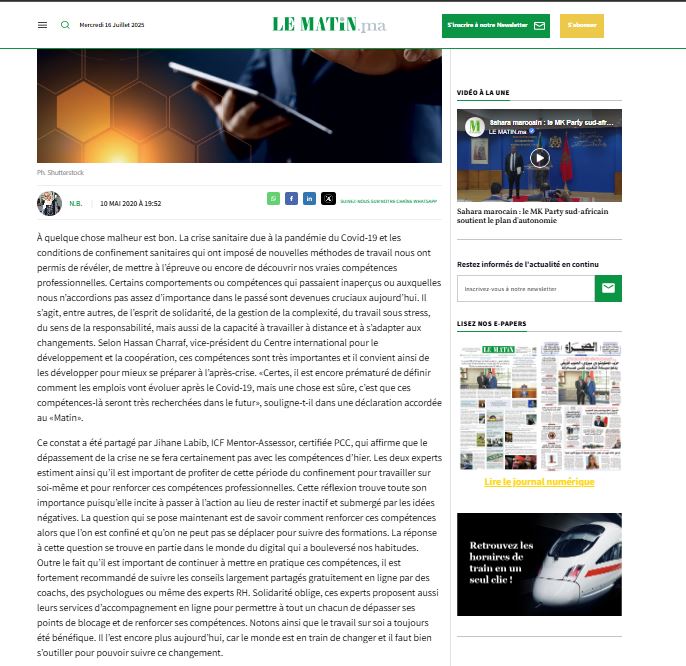– Le Matin
“The future cannot bepredicted, but it can be prepared.”
— Maurice Blondel
This quote is especiallyrelevant during the COVID-19 crisis, a time when it’s difficult toforesee how jobs and industries will evolve. What is certain, however,is that our future success depends on the behaviors and skills wedevelop today.
That’s why self-developmentis more essential than ever as we navigate the post-COVID transition.
Rather than wait, we must buildupon the skills we've uncovered or sharpened during lockdown. These will beour strengths for managing uncertainty and embracing new opportunities.
The Silver Lining of theCrisis
The COVID-19 pandemic and theconfinement it imposed forced us to adopt new ways of working, which inturn allowed us to:
- Discover hidden professional strengths
- Reassess our true capabilities
- Develop skills we might have previously ignored
Some once-overlooked abilitieshave now become critical for thriving in today’s workplace, including:
- Solidarity and empathy
- Crisis management
- Remote work adaptation
- Stress resilience
- Responsibility and self-leadership
- Agility in facing change
According to Hassan Charraf,Vice-President of the International Center for Development and Cooperation,these competencies will be in high demand in the future—regardless ofhow job markets evolve.
The Skills of Tomorrow AreEmerging Today
JihaneLabib, ICF Mentor-Assessor andPCC-certified coach, agrees:
“We won’t overcome this crisiswith yesterday’s skills.”
Now is the time for activereflection and self-investment. It’s about taking charge instead of feelingstuck or consumed by negative thinking.
But how can we strengthenprofessional skills while still confined at home?
Digital Learning Is the NewNormal
The digital world hasradically transformed how we learn. In addition to practicing your skillsdaily, you can:
- Follow free online resources shared by coaches, psychologists, and HR experts
- Join virtual coaching sessions
- Access online support services tailored to career development
Out of solidarity, manyprofessionals are making their expertise accessible online to helpothers break through limitations and grow their capabilities.
The New Competencies toPrioritize Post-COVID
This global experience haschanged the rules of the game. To move forward, organizations and individualsmust cultivate a new skillset.
Here are the top skills wemust embrace:
1. Innovation Mindset
We must become a nation ofinventors. Leaders and decision-makers must think creatively and fosterinnovation at every level.
2. R&D and CreativeStimulation
Companies should invest in researchand development, using formats like hackathons to spark creativityand problem-solving.
3. Work-Life Balance as Strategy
A new global approach isneeded—one that promotes balance between professional investment andpersonal well-being.
This includes prioritizing
- Family life
- Community involvement
- Holistic wellness
4. Dual Education and UniversityIntegration
Promote alternatingwork-study models, bridging the gap between academia and industry.
Universities must:
- Embrace full digitalization
- Encourage faculty research publication
- Mentor applied research and innovation
5. Resilience and Wisdom
These human skills must be massivelycultivated among employees, managers, and citizens.
We must learn to
- Accept the unexpected
- Extract lessons from challenges
- Conduct honest, realistic self-assessments
Identifyareas for growth with clarity and sincerity


